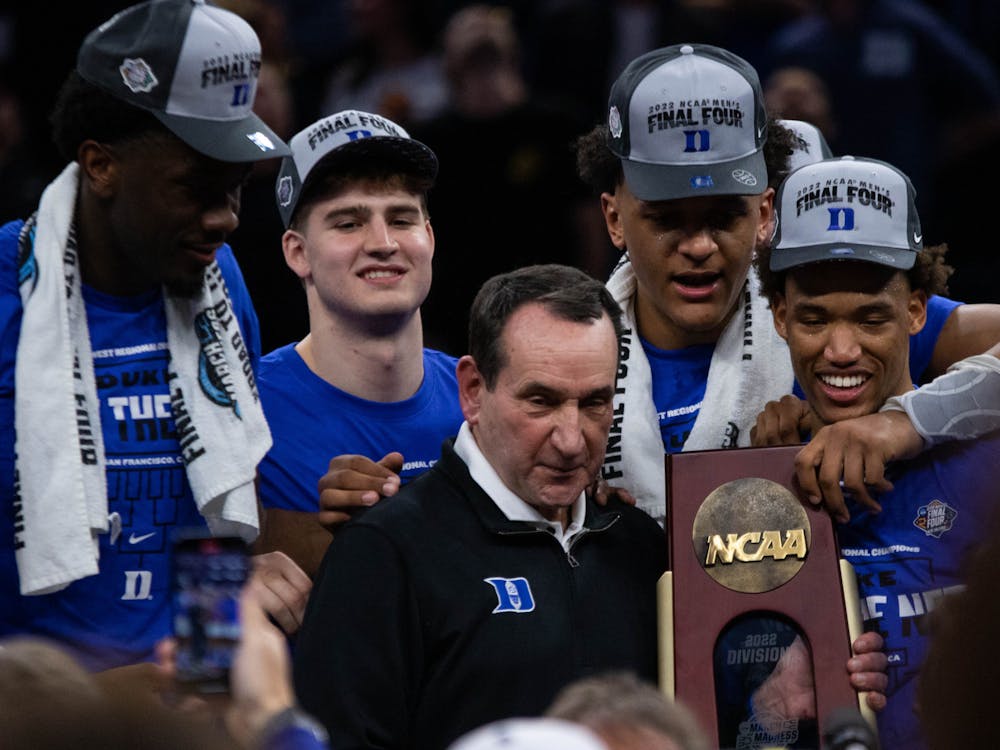In November, Wendell Moore, Jr. stood in front of a sold out Madison Square Garden crowd and motioned for fans to get louder as they conquered Kentucky. Soon after, they landed in Las Vegas and handled Gonzaga in an ear-shattering win.
It was the beginning of a farewell tour before the idea of “farewell” had set in. Before tournament play, Duke soared through most of its regular season, one that featured domination against North Carolina in the Dean Dome and being crowned the regular-season victors of the ACC.
But then came the “lasts.” The “farewells.” The questions about what every next game, tournament and title means for Krzyzewski and his last season.
And as that regular season winded down, the Duke faithful watched as Krzyzewski’s squad felt the pressure of living up to those last moments. It was a daunting, elephant-in-the-room kind of pressure that finally became physically palpable after Duke’s loss to North Carolina in Krzyzewski’s last home game, where Paolo Banchero and AJ Griffin sat with tear-glazed eyes on the bench, Banchero hiding his face in his sweat towel, looking out into the chaotic distance as Krzyzewski addressed the Cameron Indoor Stadium crowd.
That scene in the moment told the story of a team despondent after a loss that would soon become infamous. But ultimately, it represented a greater storyline: an 18- and 19-year-old having to carry the weight of determining Mike Krzyzewski’s legacy. Most freshmen in college spend their time trying to find the dining hall or a date for a semiformal. But these two were spending their year trying to write a glorious chapter in sports history for their coach, a story that was becoming too taxing to write.
It was a story that Krzyzewski didn’t want to be written.
“How do we get better if we’re always thinking about ‘the last game’ or whatever? We can’t get into that mode,” Krzyzewski said after the team’s loss to Virginia Tech in the ACC Championships. “We never talk about it at all.”
“Last weekend—the whole world was talking about it, and so it was difficult,” Krzyzewski said of his last home game against North Carolina. “It was just a very difficult weekend.”
The next “lasts” came in the ACC tournament. The Blue Devils shot just 65% from the free-throw line against Virginia Tech in the championship game. Their defensive play was characterized by foul after foul. They failed to capitalize on opportunities to grab a lead when the Hokies began to falter.
And Moore—the same Moore that earlier in the season beckoned for the crowd to get louder as Duke rained on Kentucky’s parade—only took three shots from beyond the arc.
It was a team that in a season made out to be one of lasts, they had dropped the ball at arguably the most important one up to that point: Krzyzewski’s last home game, and against North Carolina at that. It was a team with a defense that faltered to the Hokies’ shooting and with an offense that lacked identity, and it looked like they had lost faith in the gameplay that they had been building since June.
“What we’ve tried to do is just eliminate everything,” Krzyzewski said, adding that he wanted the team to “get refreshed and get ready” before NCAA tournament play.
And that they did. The tears have dried, and the storyline of lasts is being rewritten. Duke’s performance in the NCAA tournament has been equally the story of players and coach.
“The thing that drives us a lot is not only it being Coach’s last year, but you know, it’s our last time as a group, as a team, to be together as a group…. We all love each other, we've all been together since June, and we don’t want to cut it short in any way; we want to stretch this thing as long as it can go,” Banchero said at a media availability in March.
That love for each other and winning became evident in the final minutes of Duke’s contest against Michigan State in the Round of 32. Down 70-65 with the final minutes of the second half ticking down, Moore hit his free throws, sophomore guard Jeremy Roach and freshman guard Trevor Keels sunk two electric 3-pointers and Banchero made easy work around the Spartan defense to finish at the net. And Duke was up by four with a minute left.
It was a moment characterized by “heart and togetherness,” as Krzyzewski remarked after the game. It was the same energy Duke brought to the table at the beginning of the season in New York and Las Vegas with no “lasts” on the line. It was a group of basketball players who loved each other, who loved winning, and who loved the madness of March—the same ones who took the court in November, who knew it was no longer about writing Coach K’s story. They knew it was time to write theirs.
The next game, up five with 30 seconds left against Texas Tech in the Sweet Sixteen, Banchero winked at the camera.
And it felt like that Gonzaga game all over again.
Get The Chronicle straight to your inbox
Signup for our weekly newsletter. Cancel at any time.

Leah Boyd is a Pratt senior and a social chair of The Chronicle's 118th volume. She was previously editor-in-chief for Volume 117.

